“Exactly in some ways, different in others.”
So describes the similarities to Earth of planet 892-IV (also known as Maga Roma). The Enterprise has found a 20th Century Roman Empire and Hodkin’s Law of Parallel Planetary Development strikes again. “Bread and Circuses” has it all: a high concept plot, richly drawn characters, humor, suspense, action, a blonde bombshell with a name ending in the requisite letter “a,” and great acting. It is also notable for plumbing the depths of the Spock-McCoy relationship and dealing directly with religion, which makes it unique among TOS episodes. Now it is new and improved and remastered…with double the moon goodness. The episode also has enough plot holes to swallow a dozen starships, but more on that later.
Logic v. Emotion
The script by Roddenberry and Coon (Star Trek’s “genes,” literally and figuratively) sets in stark relief the struggle between logic and emotion as exemplified by Spock and McCoy. The interaction is elevated beyond “bickering” into an exploration of deeply held differences on issues that matter—the nature of the Empire, the treatment of the slaves, and being true to ones self.
There are few more moving scenes in all of Trek than between Spock and McCoy in the jail cell. McCoy zeroes in on Spock’s insecurity, verbally fires a searing insight into his character, and then watches the emotion explode in Spock’s eyes. Accusing Spock of being more afraid of living than of dying for fear that emotions may overwhelm him leads to a stunning admission by Spock—he does have genuine feeling, especially for the well-being of his captain and his friend. For all the good-natured teasing between these two earlier in the episode, McCoy finally wins an argument and gets Spock to admit his emotions, but at what cost to Spock? Nimoy and Kelley play the scene beautifully, with Nimoy using his eyes alone to convey emotion through a dead facial expression.
Spock…just let it all out
“Bread and Circuses” is replete with well-rounded and believable characters with clearly defined motivations. Certainly all of the regulars are true to themselves without a false note to be found. Kirk is rakish and clever, Spock is conflicted between emotion and logic, and McCoy is insightful, irascible, and funny. Mr. Scott comes off well, and even Uhura gets to deliver the big reveal at the end. The guest stars are superb and the humor is actually funny—the sarcasm of Claudius Marcus, the ribbing between Spock and McCoy, the doctor’s distress in the arena, and the poking of fun at the TV industry.
In many ways, the episode is about the choices people make—the choice Merik made to sacrifice his crew and then redeem himself, the choice Claudius Marcus makes to protect and perpetuate the status quo, the choice Kirk makes to uphold the Prime Directive, the choice Spock makes to reveal his inner self, and even the choice Flavius Maximus made to leave the games and follow the “sun.”
It’s all about the ratings
Give Me That Old Time Religion
B&C also has the distinction of being the original series episode most preoccupied with religion. Given Roddenberry’s professed secular humanism, it gets surprisingly sympathetic treatment. Roddenberry once wrote: “I condemn false prophets, I condemn the effort to take away the power of rational decision, to drain people of their free will—and a hell of a lot of money in the bargain. Religions vary in their degree of idiocy, but I reject them all. For most people, religion is nothing more than a substitute for a malfunctioning brain.” Well! Not very IDIC of him, is it?
One could argue that in the episodes where Kirk liberates populations from the yoke of computer control—and there are many!—the computer is a metaphor for a god or religion. In Trekdom, science always triumphs over religion, and is often ridiculed in a way reminiscent of Roddenberry’s above quote. But in B&C, it’s portrayed in a positive light, with Kirk endorsing the belief that all men are brothers and becoming excited over the prospect of another Christ.
There’s a nice bit of foreshadowing of the religious theme at the beginning of Act One, when McCoy wishes that just once he could beam down to a planet and say “Behold! I am the archangel Gabriel.” I’ve also always wondered why the slaves in hiding still wore their slave clothes with the chained links on them. I thought the links represented their enslavement, but now I think they represented the holy trinity.
Suon Worshipers Septimus and Flavius
When the Moons Hit Your Eye Like a Big Pizza Pie
The episode also gets high marks for production values. Ralph Senensky’s direction is sure, and at times, inventive. Location shooting adds immeasurably to the scope of the episode, and I particularly like the long establishing shot of the crew beaming down, as well as the from-below shot of Kirk and company journeying to the city with the sun overhead. Syndicators cut out stock footage at the beginning of Act 2 showing a series of Roman-like buildings (one of which was clearly the dome at MIT!).
CBS-D didn’t have much to do for this show. The two moons are nicely done, if not overused—at the beam down, in orbit, as they leave orbit, etc. Here a moon, there a moon, everywhere a moon-moon. The bullet holes in the cell wall are a nice, apparently random touch. The explosive charges in the trees that would indicate machine gun fire when Flavius and the landing party are ambushed in the woods are still clearly visible.



Hey look ma…two moons…did we mention there were two moons
Quibbles and Bits
Having said that, this episode stretches credulity further than Shatner’s third season girdle. If the crew is so concerned about protecting the Prime Directive and not contaminating the culture, why do they beam down in uniform brandishing Type I phasers, make liberal use of their communicators, and leave Spock’s ears exposed? Why is McCoy seen running his Feinberger over an escaped slave in the cave?
Similarly, why is Claudius Marcus so concerned about the Federation upsetting the status quo of his planet when he knows damn well the Prime Directive prevents interference? He even uses the knowledge against Kirk when the captain bluffs to beam down a hundred men with phasers.
And come to think of it, why is everybody speaking English instead of Latin, the language of ancient Rome? Stick that in your Hodgkin’s Law of Parallel Planetary Development and smoke it!
“I call them ears”
Bread and Circuses
The term “bread and circuses” refers to the policy of Roman emperors to provide grain to the unemployed masses and entertainment in the Coliseum. It’s also currently used by restaurant critics to rate the food and atmosphere of eating establishments. So in that vein, I give the substance of the episode an 8, and the entertainment value a 9.
MMM…roast kid
Kevin Ganster is a writer and editor for a major trade association in Washington, D.C. He has been an avid Trek fan since 1981.

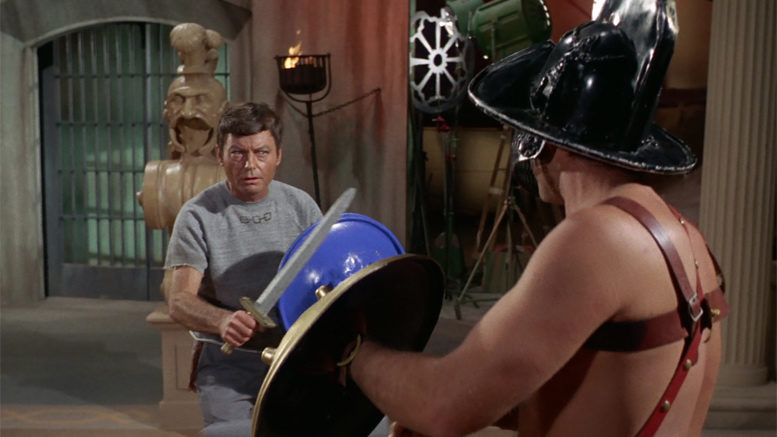
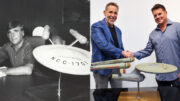
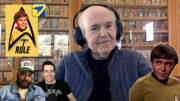
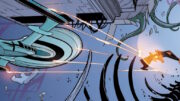
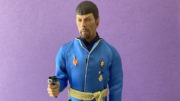
What is the source of this, and when did Gene say it???
B&C also has the distinction of being the original series episode most preoccupied with religion. Given Roddenberry’s professed secular humanism, it gets surprisingly sympathetic treatment. Roddenberry once wrote: “I condemn false prophets, I condemn the effort to take away the power of rational decision, to drain people of their free will—and a hell of a lot of money in the bargain. Religions vary in their degree of idiocy, but I reject them all. For most people, religion is nothing more than a substitute for a malfunctioning brain.” Well! Not very IDIC of him, is it?
—
Nicely done review of what was probably, in spite of its many flaws, the best of the “Strange Old World”/parallel earth episodes that seemed to dominate parts of the second season. Let me just further note that the sharply-written taken on 20th century television (“Bring down this network’s ratings, Flavius, and we’ll do a ‘special’ on you!”) took satire in this franchise to heights it has rarely equaled since, and that for all of the sympathetic treatment of the “Sun Worshipers” as principled pacifists (not very reminiscient of even early Christians in that respect, truth be told), the show did not flinch from also depicting them as provincial and blissfully ignorant of the larger universe around them. Very courageous writing for the time, and one of the best examples of Roddenberry’s idea of using science fiction to comment on subjects that couldn’t be approached on network television more conventionally.
Excellent review Kevin and some good insights on the characters and the religious overtones. And I like the shout out to Uhura who gets her Twilight Zone moment reveal on the ‘son’ worshipers
One of my favorite Star Trek episodes. B&C, along with C.S. Lewis’ space trilogy, inspired me as a youth to write SF with a Christian bent (something I still do, including two episodes of a direct-to-DVD miniseries now in production). Glad to see it in the first batch of remastered episodes!
The quote from GR is actually two combined extracts from a discussion on religion from pages 118-119 of Gene Rodenberry, The Last Conversation, by Yvonne Fern. Published Pocket Books.
The book features an extended conversation with GR before his passing, which reveals his brilliant intelligence and insights into the human condition. I have re-read it several times over the years. I’m very grateful to Ms. Fern for this book!
Should have wrote “Published by Pocket Books…”
It’s great to analyze this one. For all its (minor) flaws, it holds up better than many TV shows made today that are nothing more than stiff actors (David Caruso) connecting splosions and morbid murders beneath heavily processed film and lighting.
This episode was written. Thoughts live here. Words are used to great effect. Actors look at the page and clearly can’t wait to get in front of the cameras.
Nice review, Kevin.
1 Chris — hit Wikipedia.org and you’ll find lots more of Roddenberry’s anti-relious quotes. I’m not 100% sure he was an atheist, despite his protests. There are so many religious and themes of messiahs, resurrection and redemption in his later pilots, The Questor Tapes, Earth II and Genesis II, and even Earth: Final Contact.
Anyone’s welcome to jump on that string… I have no problem if he was. I also giggle when Shatner, a Jewish actor, considers Christ and smiles.
Good review. Roddenberry: the last interview has his views, of course. And ome could ask; Why does everybody in the galaxy speak english? But that’s a necessity of TV. That and how obtrusive carrying universal translators everywhere would be.
UHURA
I’m afraid you have it all wrong, all of you. I’ve been monitoring some of their old-style radio waves, the empire spokesman trying to ridicule their religion, but he couldn’t. Well, don’t you understand?
It’s not the sun up in the sky. It’s the son of God.
KIRK
Caesar … and Christ, they had them both. And the word is spreading
only now.
McCOY
A philosophy of total love and total brotherhood.
SPOCK
It will replace their imperial Rome, but it will happen in their 20th century.
KIRK
Wouldn’t it be something to watch, to be a part of? To see it happen all over again?
Enough said.
^2
I think you need to re-read your history of the early Christian martyrs. Nero made human candles of hundreds, if not thousands, after Rome burned. Nero himself is thought to have set the fire as an excuse to slaughter the Christians and their rival allegiance, not to mention to clear land for his building program.
^7
I have long believed that moment to be one of Shatner’s finest. Not only do I think it possible he might truly agree with the sentiment, it points to an age, not so long ago, when it was possible to see the good in all without front-loaded political ideologies as in today’s neo-Leninist Political Correctness.
Christ reformed Rome through his death and set the stage for the world as we know it today. It is a shame that fallen Man could not use this inestimable gift more perfectly, but the world of Bread and Circuses is the world we would have absent Christ’s visit to us some 1,980 years ago. If Paul nee Saul, a killer and proud of it, could be convinced to repent of his bloody ways and preach the Word, perhaps it is possible for the rest of us.
As for Roddenberry’s ever-changing view of religion and Christianity in particular, well it seems self-serving to me. He is a known adulterer; a playboy before it was fashionable; he dabbled in drugs; an ego-maniac by anyone’s standards… Born a Methodist, married in a Budhist ceremony, later a blind, zealous follower of John Dewey’s Secular Humanism, one forms the impression that Roddenberry hated himself more than he hated God, and spent his whole life trying to stick it in God’s eye. In the end, he destroyed only himself and those poor slobs who took their cues from his dreary and banal television programming (e.g., ST:TNG etc.).
As for TOS, it could not help but be infused with the Christian ethos, it being a product of its time. And that is the ultimate irony of the would-be atheistic Gene Roddenberry, The Man Who Would Be His Own God.
On the origins of religious secularism and related issues often seen in Roddenberry Trek:
http://www.belcherfoundation.org/programming_the_judicial_machines.htm
Under “Quibble and Bits,” I would add: What about the remainder of the crew of Merik’s ship? Merik states that those of his crew who have adapted to this world are still alive…Maybe Kirk sent a team of red shirts down to pick them up…?
And what about the phasers, communicators, tricorder, medical kit, etc. left behind by Kirk, Spock and McCoy?
Steve Johnson
The beam out is one of my favorite scenes in all of Trek.
I like Kirk’s statement in “Who Mourns for Adonais?”: “Mankind has no need for gods. We find the one quite adequate.”
As a young, Christian teen watching this episode in the 70s, I saw it as a validation of my beliefs.
Later, I realized that for all of Hodgkins Law acting on this one planet, you could look at this episode as rather a repudiation of the truth of Christianity. After all, it doesn’t seem as though Christ appeared on (or at least was an obvious influence on) all the other worlds the Enterprise visited. What conclusion can we draw from that? Christ is only the Son of God on a couple of planets in the galaxy? Christ was only necessary for the salvation of two planets? Earthlings are to preach the Christian gospel to all the planets bereft of God? What?
I realize that religious discussion on a Trek forum is as loaded as political discussion, but discussion of the subtext of this episode is almost impossible without mentioning religion! For what it’s worth, I’m still a Christian, but I respect the rights of all to believe as they choose. I’m not here to proselytize, just calmly chat about Trek.
Scott B. out.
#14 is consistent with IDIC; #10 is not.
I also wanted to say I think this is the best review I have read on this site, and there have been some good ones. It was devoted to the episode and not to an attempt to show the writer’s cleverness or wit. It was respectful of the material while being critical of it; it used criticism in a mind-expanding use of the word. The review shed light on the distinct strengths of the episode, which makes viewing it a better and deeper experience. The review surveyed all the aspects of the episode, from characters, ideas in the story, and production values. All in all a superb review. Thank you Mr. Ganster!
#13, “We find the one quite sufficient”. I thought of the same thing when I read the above review. I hadn’t remembered that line until I saw the episode recently. It’s nice to know that religion (of some monotheistic variety) hasn’t been completely swept away in the future.
I always loved Larry Norman\’s song, U.F.O. – lyrics applicable to some of the above comments:
He\’s an unidentified flying object
you will see Him in the air
He\’s an unidentified flying object
you will drop your hands and stare
you will be afraid to tell your neighbors
they might think that it\’s not true
but when they open up the morning papers
they will know they\’ve seen Him, too
He will come back like He promised
with the price already paid
He will gather up His followers
and take them all away
He\’s an unidentified flying object
He will sweep down from the sky
He\’s an unidentified flying object
some will sleep but will not die
He\’s an unidentified flying object
coming back to take you home
He\’s an unidentified flying object
He will role away your stone
and if there\’s life on other planets
then I\’m sure that He must know
and He\’s been there once already
and has died to save their souls
He\’s an unidentified flying object
you will see Him in the air
He\’s an unidentified flying object
you will drop your hands and stare
He\’s an unidentified flying object
coming back to take you Home
He\’s an unidentified flying object
He will role away your stone
I don’t think it was me – only that last verse, but not the last chorus, was supposed to be bold.
Old-Timey, your armchair psychoanalysis of Gene Roddenberry–not to mention your less-than-(Christian?) charitable assessment of the character of the man who brought so much enjoyment and inspiration to millions, including yourself–is, to put it in terms no more polite than you deserve, a crock.
As for the history, once again I believe you’re rather confused. My point was not that the early Christians weren’t severely persecuted by the Roman authorities–indeed they were–but that they weren’t for the most part the sort of gentle pacifists depicted in “Bread and Circuses.” Indeed, once they converted the emperors Constantine and Theodosius to their cause and established Christianity as the new state religion, followers of the Galilean proceeded to persecute “heretics” (and even each other) in doctrinal disputes that date from the earliest days of the Roman Church, in a manner that would have mortified their gentle Savior, just as it surely would have amused His tormentors. No wonder Julian the Apostate tried to turn Rome back to paganism–as a learned man, schooled in the Bible as well as the greatest works of classical literature and philosophy, he couldn’t abide the hypocrisy of a religious movement that claimed everything of importance lay in the next world while at the same time amassing treasure and state power in this one. A military genius and Rome’s last great general, he won an unbroken series of victories in the field until one his own generals, a Christian, reportedly murdered him.
We’re agreed that what we are now is very much the result of what they did then. I’m just not sure how as a Christian that’s anything for you to be proud of.
Religion was a HUGE part of Star Trek: Deep Space Nine. Bajorans, Klingons, Ferengi… all three races had numerous episodes dealing with their religous beliefs. Even Sisko’s father quotes the bible in one episode. Religion certainly has its place in Trek.
Trek is actually in favour of logic and science. Gods and worship in Trek are often ridiculed, especially in Star Trek the Next Generations ‘Who Watches The Watchers?’.
Favourite Trek line ever comes from ST5
“What does God need with a starship”?
When Trek does delve into religion, science inevitably provides an answe, the prophets were wormhole aliens and gods in general are always powerful (often malevolent) aliens.
I had always assumed that, in Star Trek, that every member of Starfleet carried (or had implanted) a Universal Translator that allowed them to instantly speak and understand most languages. In fact, given the reactions of the crew in certain situations, I had also assumed that the Federation did not speak English. How many times did we see a telepathic species send a message to the bridge, only to see a conversation similar to this:
“Amazing… the message was sent in Vulcan.”
“No Mr. Spock. It was perfect English.”
“You’re both wrong. It was Swahili.”
“But… I heard it in Russian!”
The fact that everyone on board still spoke (and thought) in their mother tongue, and that to hear it (including English) from an alien was a big deal, I assumed that there was a common language adopted by the UFP, spoken by all races, assisted by the Universal Translators.
They allude to this further in ST:VI when Kirk mentions to the alien on Rurha Penthe that, “the Universal Translator’s been confiscated” (indicating he had it with him when he beamed from the Enterprise to Kronos 1). It also appears that while the UTs are effective, that they can be easily identified when in use, which led to the humous Klingon translation scene in that same movie.
So… the citizens of Maga Roma didn’t necessarily speak English… but the crew (and viewers) all understood what they were speaking due to the UTs.
It’s good to have a Babelfish in one’s ear!
#23 — In the unedited version of the episiode, Spock notes not once, but twice, that the inhabitants are speaking English, another example, he says, of Hodgkins Law of Parallel Plantery Development.
I have to admit I was preparied to dislike your review but I have to admit you were right, dead on right on all accounts! This is one of my favorite episodes- in the top 3- and you did it proud, Thanks for a great job.
For the most part, Star Trek has leaned more to the secular humanism (humanoidism?) side than the Christian. The moralistic elements were there (we will not kill, today) at least in the series’ . The movies were a little less concerned with those ideals (I have had…enough…of…you…).
Speaking of saviors, Vulcan had its own version of Christ in the form of Surak. Witness Spock’s reaction to his image in “The Savage Curtain.” Surak saved Vulcan from savagery with non-violent logic.
It begs the larger question of, if there really are aliens, how this concept applies to them. Does each race have its own version of Christ? Would the aliens be so different that concepts like sin and salvation do not apply to them but only to humans?
As far as what language they speaking in Star Trek: In “Tomorrow is Yesterday”, Capt. Christopher states to Kirk: “You speak English.” Kirk says “that’s right”.
This was a superb review, enhancing my enjoyment of the episode. Thanks for the time and effort spent writing it.
Ditto Granger!
Great review of a very fun episode!!!!!!!!
Great review! As for Shatner “agreeing with the sentiment” about being excited about another Christ, Shatner is Jewish so I have my doubts about that.
In either Whitfield’s The Making of Star Trek or Gerrold’s The World of Star Trek there’s a line about there being an assumption that universal translators are “sewn into the pants leg” of uniforms (no idea where they are on Starfleet miniskirts) and are constantly translating alien/foreign languages into something understandable by the crew. Trek at least tried to address this issue but they were inconsistent about it.
I do think the anti-religious bent in TOS and much of later Trek (see TNG’s “Who Watches the Watchers”) is very clear and DS9’s approach was kind of the exception that proves the rule. In any case, this is definitely one of my favorite episodes.
After the Altman “Patterns of Force” catastrophe a couple weeks ago, I admit I was concerned about this review and whether the reviewer would address Trek’s most direct examination of Christianity without diatribes, insults, or political commentary. I am happy to say that Kevin Ganster’s funny, thoughtful, and even-handed review completely assuaged my fears. Bravo.
One wonders how much of the episode Roddenberry actually had anything to do with, given the contrast between B&C’s generally positive portrayal of Christianity and Roddenberry’s supposed anti-religion beliefs. Look at Kirk’s face, the tone of his voice, when he utters the line “Wouldn’t it be something to watch, to be a part of? To see it happen all over again?” It’s perhaps the Shat’s best moment as an actor – he conveys an almost startling impression of awe and reverence. Combined with the above-mentioned line from “Who Mourns For Adonis,” it does offer some evidence that the 23rd century may not be as entirely free of faith as some “humanists” may like to think.
It would be interesting to key some of Roddenberry’s famous anti-religion quotes to the specific times in his life when he expressed them, and put them back into the context to get the whole story. Might be illuminating.
I’m assuming Roddenberry came up with the basic story for Bread & Circuses and Coon wrote the script. As for the Who Mourns For Adonais? line, remember that the “we find the one sufficient” was added at the request of the network standards and practices division–the original line was simply “We’ve grown too old for gods.”
This is one of my favorite TOS episodes, but watching it again, I was cringing at the oil lamps used for lighting. Wha? 20th Century Rome with oil lamps? Not very efficient lighting, inconvenient, and dangerous.
Just a nitpick.
Great review and quite an insightful set of comments.
This ep plays better than I remember it.
TOS could pull something like this off- something Voyager could NEVER get away with.
This is a pretty good episode. Sure, the parallel evolution of a Roman Empire that doesn’t fall is absurd… just as the “Miri” planet with identical continents was absurd. Or a gangster planet that came about from imitating a book.
But it works. They weren’t trying to write a series that would still be cross-examined 40 years later and fit in with a complicated tapestry of future history, they were trying to write an imaginative TV series and incidentally trying to keep costs down by using stuff that already existed on backlots.
Something that struck me was, the slave costumes would be a rather simple and yet subtle touch at a Trek convention. Grey t-shirt with that chain symbol, gray paints, dark shoes, and you’re ready to go! And you could always add a sword to help people “get it.”
“In Trekdom, science always triumphs over religion, and is often ridiculed in a way reminiscent of Roddenberry’s above quote. ”
Star Trek often ridicules science?